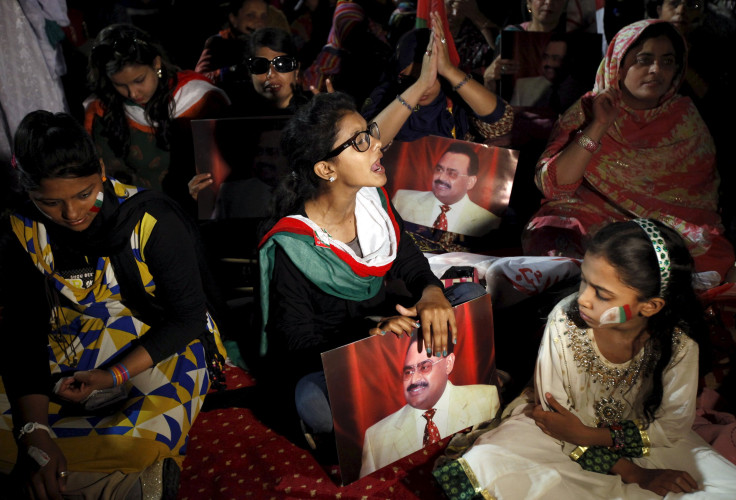Pakistan Military's Move On Karachi Seen Part Of 'Creeping Coup'

(Reuters) - The chief of Pakistan's main spy agency is spearheading a campaign to wrest control of the teeming port city of Karachi from a powerful political party, the military's latest, and some say boldest, foray into civilian life in recent years.
According to military officials, police officers and members of the Muttahida Qaumi Movement (MQM) party which has traditionally dominated Karachi, Rizwan Akhtar has decided the time for policing the city from the sidelines is over.
"There is a quiet, creeping takeover of Karachi by the military," said a government official close to Akhtar, head of the Inter-Services Intelligence (ISI) agency, which traditionally acts as an extension of army power in Pakistan.
"Karachi is just too big ... too much land, too much business, resources. No one party will be allowed to rule Karachi from now on," added the official, who declined to be named.
The sweltering, violent metropolis is Pakistan's largest and wealthiest city. It accounts for half of national revenues and hosts the stock exchange, central bank and a giant port.
The military's crackdown in Karachi started late in 2013, when the murder rate soared and mutilated bodies were dumped in alleyways daily.
The operation, which escalated last month, is officially aimed at criminals and militants, but some say MQM is the real target.
Army spokesmen did not respond to requests for comment.
Weakening the MQM's grip, and particularly that of exiled leader Altaf Hussain, would free space for other political parties seen as more sympathetic to the military, like Pakistan Tehreek-e-Insaf, led by former cricketer Imran Khan.
It would also give the army leverage over Pakistan's economic hub. That complements other steps taken in the last two years to tighten its grip on national security, foreign policy and the judiciary through the introduction of military courts.
The army's increasing influence could make it harder for Prime Minister Nawaz Sharif to deliver a rapprochement with India that he promised when he won elections in 2013.
"MISSION CREEP"
Critics call it "mission creep" and say the army's power grab is a setback for Pakistan, where the military has ruled for about half the country's history.
But police in Karachi are seen as too weak or corrupt to stamp out violence effectively, so many residents are willing to rely on the military despite its history of coups and accusations of rights abuses.
Last month, paramilitary Rangers swooped on the MQM's headquarters in Karachi, seizing arms and detaining "criminals", including a fugitive convicted of murder.
It was a direct challenge to the authority of Hussain, who, despite living in London since he fled murder charges in Pakistan in 1991, leads the party and remains one of the country's most powerful figures.
The army has long accused the MQM of racketeering, kidnappings for ransom and targeted killings in Karachi. Police recorded 2,507 murders in the city in 2013, up from 278 in 2006.
MQM denies the charges against it, but says that, while it has cooperated with Rangers in the past, the party will resist attempts to break it up.
"What is happening now (raids and arrests) is inconceivable to us," said MQM leader Haider Abbas Rizvi. "But they will not be able to dismantle the party, if that is the plan."
Senior government officials said the civilian administration in Karachi had been sidelined, and that decisions were being taken by the head of the Rangers and the chief military commander for Sindh province.
Both are backed by Akhtar and the army chief. The Rangers declined to comment for this article.
According to the officials, the government was not consulted either before the raid or when Rangers lodged a criminal case against Hussain last month.
Sindh's governor, who has ruled the southern province where Karachi is located for 13 years, and chief minister are being excluded from regular security meetings they previously chaired.
"SWEAT AND BLOOD"
MQM leaders said the military had launched a campaign of mass arrests and "disappearances" of political workers, and said they were being unfairly targeted.
At least 2,600 MQM workers had been arrested since the operation began, they said, and 36 members killed. But law enforcement officials said it was time to dislodge what they called a "militant" party.
"If Altaf Hussain steps down, the MQM will live on; if he doesn't, the party will go down with him," said an official with knowledge of the army's new strategy in Karachi.
In the past, the party has resisted attempts to rein it in by shutting down the city and hurting Pakistan's economy.
This time, though, there has been little hostility. Party insiders express frustration with Hussain, who gives rambling, contradictory speeches to rallies by telephone from London.
"We have built this party with our sweat and blood. Now a man living in exile ... is intent on destroying it," said a senior MQM leader, who did not want to criticize Hussain openly.
Hussain remains defiant. After MQM comfortably won a Karachi by-election on Thursday, he declared: "the people and Altaf Hussain have a special relationship which cannot be shaken."
© Copyright IBTimes 2025. All rights reserved.





















